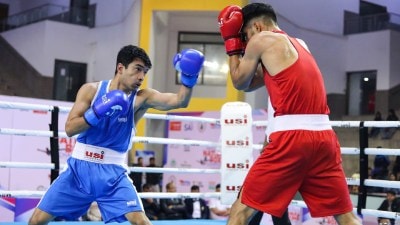3 JeM militants held for attack on Gen
Pakistan police have arrested three militants of the banned Jaish-e-Mohammad outfit for their alleged involvement in the attempts on the lif...

Pakistan police have arrested three militants of the banned Jaish-e-Mohammad outfit for their alleged involvement in the attempts on the life of President Pervez Musharraf.
Authorities picked up Ghulam Murtaza, Ghulam Rasool and Saad from their houses. 8216;8216;Though the authorities have no evidence regarding their involvement in the assassination bid, they have some leads into their involvement in the attack,8217;8217; the Daily Times quoted Pakistani officials as saying.
It said investigators believe that the suicide bomber, Muhammad Jamil, was trained by these men. 8216;8216;The three militants were earlier arrested for being involved in the attacks on churches in Murree and Taxila, but were released as no connection could be established,8217;8217; the officials added.
Meanwhile, a Pakistan Army official said its troops killed a spy chief in Osama bin Laden8217;s Al Qaeda network.
Military spokesman Major General Shaukat Sultan told reporters that troops had killed 63 militants, including an Al Qaeda intelligence chief whom he identified only as 8216;8216;Mr Abdullah8217;8217;.
He would not provide further details such as the man8217;s nationality, full name or how and when he was killed. 8216;8216;He was killed in this operation,8217;8217; he told reporters. 8216;8216;The casualties were relatively high but a small cost for the lofty cause of elimination of terrorism from Pakistan society,8217;8217; Sultan said. The Army said it would flush foreign fighters from its mountainous tribal territories bordering eastern Afghanistan after a bloody offensive in South Waziristan district ended on Sunday with more than 100 people killed. US forces are hunting on the other side of the border in a pincer operation.
Sultan said a wounded senior Uzbek Al Qaeda leader, Tahir Yuldashev, was on the run. Yuldashev was the 10th most senior member of Al Qaeda and was now hiding somewhere along the Afghan border, he added.
Capturing Yuldashev would be a prize for Musharraf accused by conservative Islamic politicians of pandering to US President George W. Bush at the expense of Pakistani Muslims in the South Waziristan offensive.
Yuldashev, leader of the Islamic Movement of Uzbekistan,was accused of a series of deadly bomb blasts in the Uzbek capital, Tashkent, in 1999 and is rumoured to have led resistance to American forces during the fighting in Afghanistan in the spring of 2002 in the war against terror.
The military claimed victory after securing the release on Sunday of 12 troops taken hostage when the fighting began, but about 50 soldiers were killed and an unknown number of fighters escaped, possibly through a labyrinth of tunnels.
- 01
- 02
- 03
- 04
- 05































